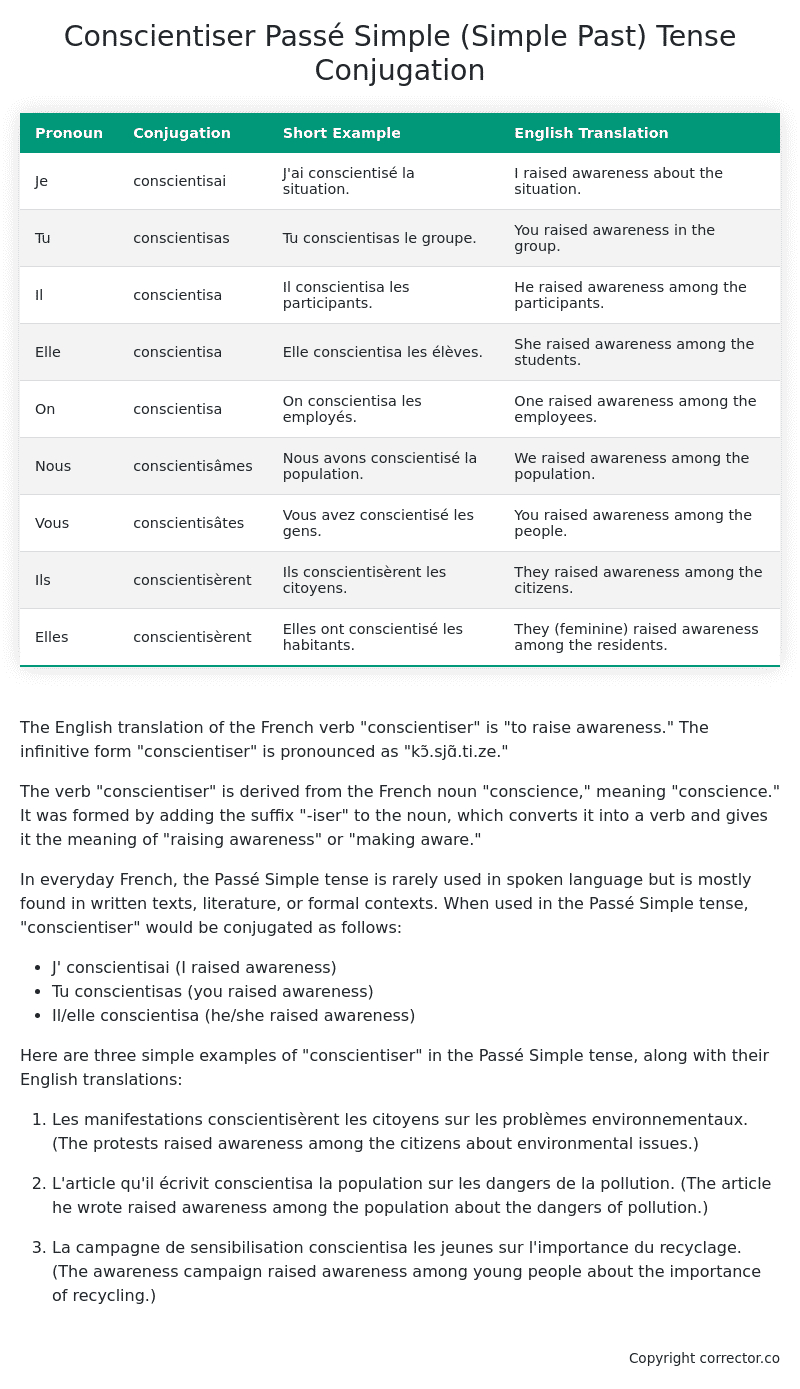Passé Simple (Simple Past) Tense Conjugation of the French Verb conscientiser
Introduction to the verb conscientiser
The English translation of the French verb “conscientiser” is “to raise awareness.” The infinitive form “conscientiser” is pronounced as “kɔ̃.sjɑ̃.ti.ze.”
The verb “conscientiser” is derived from the French noun “conscience,” meaning “conscience.” It was formed by adding the suffix “-iser” to the noun, which converts it into a verb and gives it the meaning of “raising awareness” or “making aware.”
In everyday French, the Passé Simple tense is rarely used in spoken language but is mostly found in written texts, literature, or formal contexts. When used in the Passé Simple tense, “conscientiser” would be conjugated as follows:
- J’ conscientisai (I raised awareness)
- Tu conscientisas (you raised awareness)
- Il/elle conscientisa (he/she raised awareness)
Here are three simple examples of “conscientiser” in the Passé Simple tense, along with their English translations:
-
Les manifestations conscientisèrent les citoyens sur les problèmes environnementaux.
(The protests raised awareness among the citizens about environmental issues.) -
L’article qu’il écrivit conscientisa la population sur les dangers de la pollution.
(The article he wrote raised awareness among the population about the dangers of pollution.) -
La campagne de sensibilisation conscientisa les jeunes sur l’importance du recyclage.
(The awareness campaign raised awareness among young people about the importance of recycling.)
Table of the Passé Simple (Simple Past) Tense Conjugation of conscientiser
| Pronoun | Conjugation | Short Example | English Translation |
|---|---|---|---|
| Je | conscientisai | J’ai conscientisé la situation. | I raised awareness about the situation. |
| Tu | conscientisas | Tu conscientisas le groupe. | You raised awareness in the group. |
| Il | conscientisa | Il conscientisa les participants. | He raised awareness among the participants. |
| Elle | conscientisa | Elle conscientisa les élèves. | She raised awareness among the students. |
| On | conscientisa | On conscientisa les employés. | One raised awareness among the employees. |
| Nous | conscientisâmes | Nous avons conscientisé la population. | We raised awareness among the population. |
| Vous | conscientisâtes | Vous avez conscientisé les gens. | You raised awareness among the people. |
| Ils | conscientisèrent | Ils conscientisèrent les citoyens. | They raised awareness among the citizens. |
| Elles | conscientisèrent | Elles ont conscientisé les habitants. | They (feminine) raised awareness among the residents. |
Other Conjugations for Conscientiser.
Le Present (Present Tense) Conjugation of the French Verb conscientiser
Imparfait (Imperfect) Tense Conjugation of the French Verb conscientiser
Passé Simple (Simple Past) Tense Conjugation of the French Verb conscientiser (You’re reading it right now!)
Passé Composé (Present Perfect) Tense Conjugation of the French Verb conscientiser
Futur Simple (Simple Future) Tense Conjugation of the French Verb conscientiser
Futur Proche (Near Future) Tense Conjugation of the French Verb conscientiser
Plus-que-parfait (Pluperfect) Tense Conjugation of the French Verb conscientiser
Passé Antérieur (Past Anterior) Tense Conjugation of the French Verb conscientiser
Futur Antérieur (Future Anterior) Tense Conjugation of the French Verb conscientiser
Subjonctif Présent (Subjunctive Present) Tense Conjugation of the French Verb conscientiser
Subjonctif Passé (Subjunctive Past) Tense Conjugation of the French Verb conscientiser
Subjonctif Imparfait (Subjunctive Imperfect) Tense Conjugation of the French Verb conscientiser
Conditionnel Présent (Conditional Present) Tense Conjugation of the French Verb conscientiser
Conditionnel Passé (Conditional Past) Tense Conjugation of the French Verb conscientiser
Conditionnel Passé II (Conditional Past II) Tense Conjugation of the French Verb conscientiser
L’impératif Présent (Imperative Present) Tense Conjugation of the French Verb conscientiser
L’impératif Passé (Imperative Past) Tense Conjugation of the French Verb conscientiser
L’infinitif Présent (Infinitive Present) Tense Conjugation of the French Verb conscientiser
L’infinitif Passé (Infinitive Past) Tense Conjugation of the French Verb conscientiser
Le Participe Présent (Present Participle) Tense Conjugation of the French Verb conscientiser
Le Participe Passé (Past Participle) Tense Conjugation of the French Verb conscientiser
Struggling with French verbs or the language in general? Why not use our free French Grammar Checker – no registration required!
Get a FREE Download Study Sheet of this Conjugation 🔥
Simply right click the image below, click “save image” and get your free reference for the conscientiser Passé Simple tense conjugation!

Conscientiser – About the French Passé Simple (Simple Past) Tense
Formation
Usage
Narration
Historical Context
Interactions with other tenses
Passé Composé
Imparfait
Conditional and Subjunctive
Summary
I hope you enjoyed this article on the verb conscientiser. Still in a learning mood? Check out another TOTALLY random French verb conjugation!


